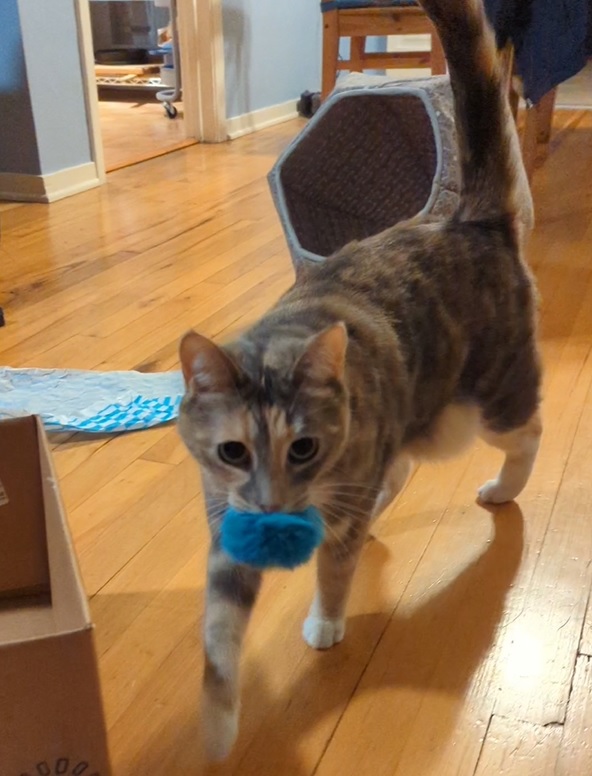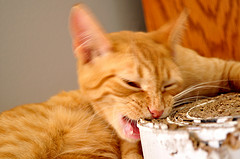Although dogs and many dog breeds have been selected for specific behaviors, the same cannot really be said of our feline friends. Through the process of domestication, we have indirectly supported cats who are friendly, more tolerant of other cats, and adaptable to many different lifestyles. But as a species, we haven’t asked them to change their behavior too much (they’re still primarily driven by the desire and need to hunt!).
Although it is believed that most dogs can learn to fetch if they don’t already have a strong drive to do so, fetching is much less commonly reported in cats.
A study published in 1986 found that almost 16 percent of respondents had a cat who fetched. Owners of Siamese cats were more likely to observe fetching behavior, suggesting a genetic component. Since then, there has been very little investigation into fetching behavior!
New research, “Fetching Felines: A Survey of Cat Owners on the Diversity of Cat (Felis catus) Fetching Behaviour“ (available as a pre-print, meaning it has not gone through formal peer review yet), explores fetching behavior in cats who fetch. There are lots of questions related to fetching, such as:
- Does it appear spontaneously?
- Does fetching require training?
- Can you train a cat to fetch?
- Are there effects of age or sex on fetching behavior?
Other examples of retrieval behavior are related to maternal care and hunting. Mom cats bring both live and dead prey to their kittens. This gives kittens opportunities to learn how to hunt as they prepare to become independent and self-sufficient. And many humans with cats who have outdoor access will attest to their cat bringing home “presents,” although the function of this behavior is more likely to be bringing home food to eat later or in a safer space rather than providing humans with a snack.
In the current survey-based study, owners of fetching cats were asked several questions about their cat’s fetching behavior, such as when their cat started fetching, and the types of objects that were fetched. Almost 1000 cat owners completed the survey about 1154 fetching cats.
What did the survey reveal about cat fetching?
The survey results indicated that more male cats fetched than female cats (or perhaps more owners of fetching male cats completed the survey). Most cats started fetching when they were less than a year old, and only 6% of the cats represented in the survey were trained to fetch. That means 1089 of the fetching cats were not trained to fetch and offered the behavior spontaneously! Cats were also more likely to initiate fetching behaviors than their owners. When cats initiated the fetch session, it was typically longer than if the owner initiated it.
Cats overwhelmingly preferred to fetch cat toys, with crumpled paper balls, hair ties and q-tips rounding out the list of most popular items to fetch. That said, cats also fetched items as diverse as cigarette packs, playing cards, and earplugs. (I should note that several of these items, especially hair ties, q-tips, and earplugs can be quite dangerous for cats to play with! If they are ingested, they can all cause dangerous intestinal blockages). Although most cats in the study lived with other cats, it was rare for other cats in the home to also fetch.

Many owners reported that their cat would drop the fetched item before fulling bringing it back to them. Owners were encouraged to share details of their cats fetching behavior, which included observations that cats would only fetch one specific toy, or only in a certain area of the home.
In general, this study revealed a lot of individual differences in fetching behavior as exhibited by cats. Cats seem to like to take the lead when it comes to fetching, and they can have specific preferences about what objects they like to fetch! Most cats who fetch do not need training to do so!
My own experience with fetching cats!
Personally, I never had cats who spontaneously fetched until recently – the three cats I have (sisters) all offered fetching behavior when they were kittens. Often, they would initiate fetching by dropping a toy (usually a rabbit fur rattle mouse) near me and wait for me to toss it. Less often, they would fetch in response to me tossing the toy. I have to admit I was pleasantly surprised and excited to have fetchers! Some interesting features of their fetching behavior:
- One cat (Coriander) has always been the most likely to fetch, although all three of them have fetched
- The fetching behavior has greatly decreased as they have aged (they are now almost 4 years old)
- Only very specific toys seem to instigate the fetching behavior
- They still chase tossed toys, but rarely pick them up and bring them back
- Often they drop the toy on the way back from fetching
So why do cats fetch? We don’t know! It is likely this behavior is part of the predatory sequence of behaviors. There are two parts to this behavior – the pursuit of the object when it is tossed, and the retrieval. Some cats seem to do both (the true fetchers), most cats will pursue moving objects (likely predatory behavior), and some cats will carry objects to home or their owner (including cats who like to bring home things like clothing and toys). As previously mentioned, bringing objects home could be related to bringing killed prey home for a safer place to consume it. However, in the case of fetching behavior, the retrieval seems more likely to be a “request” for the human to engage in more toy tossing! So perhaps this is a truly social play behavior rather than strictly predatory.
There’s still much more to learn and understand about fetching behavior. Some attention to this topic is definitely overdue, so this paper is a welcome addition to the cat behavior literature! What we need to know next is why SOME cats fetch, and some don’t…
References
Forman, J., Renner, E., & Leavens, D. (2023). Fetching Felines: A Survey of Cat Owners on the Diversity of Cat (Felis catus) Fetching Behaviour.
Voith, V. L., & Borchelt, P. L. (1986). Social behavior of domestic cats. Compendium Small Animal, 8(9), 637-646.



My black Siamese loves to play fetch with a large wrapped straw used for Tea Boba drinks.
He loves the crinkly sound the clear wrapper makes.
Eventually, the wrapping is shredded and I throw it away.
Then I take a chop stick, insert it into the boba straw and use the chop stick to launch the straw across the room.
My cat always brings it back, but sometimes, not all the way back.
When he brings it back, and I did not notice, he will nip me on my leg to engage more play.
I love this cat ❤️
My cat, Shadow, was abandoned by it’s owner in the apt complexes that I live in. When the apartment was due to be repainted, after the tenant had moved out and left only their kitten behind, the kitten ran out of the home while the door was open and I found her sitting outside in 32° weather. She was not used to human interaction, and as I walked down the stairs to check on the kitten, she did not flee from me. In fact, she didn’t even respond to my presence which was a bit alarming as I thought (due to the weather) that she had died from exposure.
I spoke softly to her, asking her if she was okay,nand she looked up at me with big, sad eyes and I immediately said to her, “hey little buddy, I’m going to pick you up .. please don’t maul me!” She allowed me to pick her up and I immediately carried her inside. She was a bit startled when I sat her down inside the apt, most likely due to the new surroundings, but I gently spoke to her and told her she was safe. She immediately responded by running to me and allowed me to love on her. We’ve been inseparable ever since. I named her Shadow bc she is a black cat, but also bc she literally follows me everywhere I go.
She is now a little over 2 years old, and loves sitting in the window sunbathing, eating, and sleeping. Imagine my surprise when she brought me a tiny bouncy ball and sat it down on the rug in front of me. I tossed the ball, assuming she would not chase it, but was just intrigued by it. Boy was I wrong! This kitty loves playing fetch! When I am in the bathroom getting ready for work, or just getting out of the shower, sometimes she will even pat a ball under the door to initiate play…if I roll it back to her under the door, she immediately will roll it back to me!
She’s incredibly intelligent, has a silly/goofy demeanor and is not so graceful, but I am forever thankful that she was brought into my life. She’s truly my little buddy and is so much fun to have around. She enjoys being cuddled, has no trust issues with me (although is shy towards new people). It’s amazing how much she’s grown and developed a personality since being in a safe environment.
Cats truly are special creatures and after reading this article, I am so surprised to hear that not all cats play fetch! I assumed this was innate to their personality…as my little buddy cannot get enough of this game! Thank you for sharing this story. It makes me realize how truly unique and special my cat truly is!